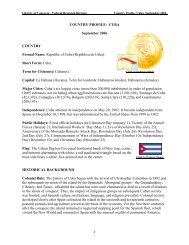1 - American Memory
1 - American Memory
1 - American Memory
Create successful ePaper yourself
Turn your PDF publications into a flip-book with our unique Google optimized e-Paper software.
222<br />
every protection that the U.S. Congress can provide as the people in<br />
New York, Miami, or New Orleans. The U.S. Congress would not<br />
stand by and watch the populations of major cities in the continental<br />
United States suffer when and if their transportation lifelines are cut<br />
off.<br />
Hawaii has suffered many crippling strikes since October of 1946.<br />
That strike lasted 53 days. Other strikes have lasted 96 days and 177<br />
days. Think of the devastation to our economy and to our people dur-<br />
ing a strike that lasts 177 days. Would the members of this committee<br />
allow their constituents back home to suffer this kind of blow and still<br />
expect to keep their confidence ?<br />
My husband makes his living from the sweat of his brow and there-<br />
fore we understand the many good things that have been brought<br />
about by labor unions. But when 300 members of a Pacific coast union<br />
can cut life off for 850,000 people in Hawaii by staging a shipping<br />
stoppage, then something is wrong. There is a definite imbalance that<br />
must be corrected. We are not against the rights of the labor unions<br />
involved, but our welfare must be taken into account and protected by<br />
law.<br />
It is said that when shipping is tied up, then we can go to air freight<br />
as an alternative means of getting goods to Hawaii. I say this is a<br />
totally unacceptable alternative especially for those of us of moderate<br />
means, because the cost of air freight is up to 10 times that of surface<br />
shipping. After the goods are air-freighted in, guess who pays the<br />
total tab ? You guessed it, not the businessman, and certainly not the<br />
union. The tab is paid by the people like me who have to have the mer-<br />
chandise or starve.<br />
We don't have our own rice paddies or taro patches in Hawaii any<br />
more. Under modem zoning laws the majority of us, because we are<br />
in residential districts, can't even have poultry or small livestock that<br />
we can feed our families on during an emergency. We are at the com-<br />
plete mercy of the conveniences of the modem supermarket. And if<br />
that supermarket cannot receive the goods because of a shipping tieup,<br />
we simply don't eat.<br />
The State of Hawaii presently depends on an average of 18 sched-<br />
uled cargo vessels and five barges a month for almost every necessity<br />
of modem living. And, in turn, these ships and barges take our local<br />
produce to mainland markets. What I am saying is that we not only<br />
don't eat normally because of shipping tieups, but after a short while<br />
of not being able to ship to the mainland our local producers begin<br />
laying people off their jobs.<br />
A noted Hawaiian economist has said that long strikes also have a<br />
slowing down effect on the construction industry, which increases<br />
unemployment and underemployment, decreases total personal income,<br />
retail trade and toiirist arrivals. In addition, he said, there are price<br />
increases and numerous small business failures.<br />
Hawaii already is in bad shape. Eight percent of her people are<br />
unemployed and something like 1 out of every 10 persons receives<br />
welfare assistance. A crippling strike at this point in time would send<br />
Hawaii into a serious depression unlike anyone has seen in the United<br />
States since the 1930's. All it takes is a shipping stoppage of 2<br />
months—and many of them have been longer than that.



![Albert Einstein Papers [finding aid]. Library of Congress. [PDF ...](https://img.yumpu.com/21604228/1/190x245/albert-einstein-papers-finding-aid-library-of-congress-pdf-.jpg?quality=85)





![American Colony in Jerusalem Collection [finding aid]. Library of ...](https://img.yumpu.com/17941275/1/190x245/american-colony-in-jerusalem-collection-finding-aid-library-of-.jpg?quality=85)



![Piccard Family Papers [finding aid]. - American Memory - Library of ...](https://img.yumpu.com/17941234/1/190x245/piccard-family-papers-finding-aid-american-memory-library-of-.jpg?quality=85)


